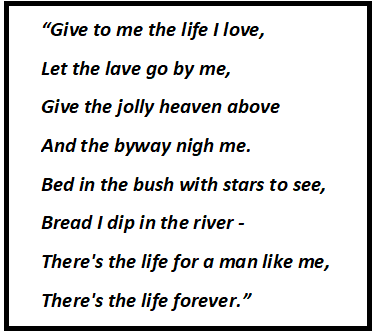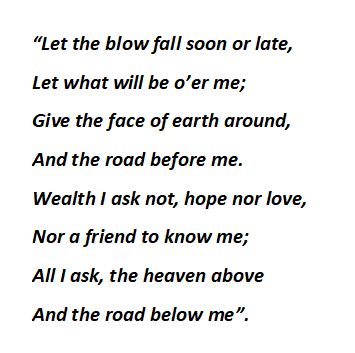Hi Everyone!! This article will share The Vagabond Questions & Answers.
This poem is written by Robert Louis Stevenson and it tells about the joys of a life of walking. A Vagabond is a wanderer who likes to travel and never settles anywhere. Below are mentioned its questions & answers. I have also shared the stanza-wise summary of this poem so, make sure to check that post as well.
The Vagabond Questions & Answers
Question 1: Read the passage given below and answer the following questions.

(a) Why does the poet want his bed in the bush?
Answer: The poet wants his bed in the bush so that he can see the stars.
(b) What does the first line in the poem state?
Answer: The first line in the poem states that the vagabond wants the life he loves.
(c) What does the word ‘nigh’ mean?
Answer: The word nigh means near.
(d) What does vagabond ask for in the above stanza of the poem?
Answer: The vagabond asks for the sky above, a bed in the bush, bread for food and river for water to drink.
(e) What does the poet want from life?
Answer: The poet wants a life which is carefree and wandering. He wants to sleep on the grass and watch the open sky above it. He wants drink water from the river and eat only bread.
(f) What does the word ‘lave’ refer to in the above passage?
Answer: The word ‘lave’ refers to a flowing water body,that is a river in the above passage.
Must Read: The Lumber Room Questions & Answers
Must Read: A Grain as Big as a Hen’s Egg Questions & Answers
Question 2: Read the passage given below and answer the following questions:

(a) What does the vagabond not wish for?
Answer: The vagabond does not wish for wealth, hope, love or a friend.
(b) What does the vagabond ask for?
Answer: The poet asks for the heaven above him and the road below him.
(c) Why do you think the poet repeats the lines –
“All I ask, the heaven above
And the road below me.”
Answer: The poet has repeated the lines in order to emphasize on what the vagabond really wants in life. Repetition is the figure of speech used in these lines in order to create this emphasis.
(d) Give the antonym of the word ‘hope’.
Answer: Despair
Must Read: The Mystery Of The Bermuda Triangle Questions & Answers
Must Read: Bangle Sellers Stanza-Wise Summary
Question 3: Explain the following line:
All I seek, the heaven above
And the road below me.
Answer: The line means that all that the poet wants is the great outdoors, with the sky as his roof and a road to travel.
Question 4: What does the poet mean by these lines ‘Let the blow fall soon or late, let what will be o’er me’ in the poem?
Answer: By these lines, the poet means that he is ready for death which would come sooner or later and if it does not come, he has the roads before him to travel around the whole world and the sky above him.
Question 5: Which lines in the poem show us that the vagabond wants to completely avoid all human association?
Answer: The lines in the poem which show us that the vagabond wants to completely avoid all human association are:
“Nor a friend to know me;
All I ask, the heaven above
And the road below me”.
The Vagabond Questions & Answers
Question 6: What does the poet say about autumn and winter?
Answer: The poet speaks of harsh conditions in autumn and winter that the vagabond may have to face while living in the open. However, the poet further states that even these harsh conditions will not stop a vagabond from living in the open because all he yearns for is freedom above everything else.
Question 7: How does the poet lead his life during winter?
Answer: During winter there is no change in the poet’s lifestyle. He roams in the frosty fields where the cold is so severe that blood almost freezes, the finger looks blue and the fields are covered with snow. He eats whatever food he gets from the frosty fields. He keeps himself warm with the help of someone else’s fire and continues with his everlasting journey without stopping because of winter.
Question 8: What kind of imagery does the vagabond evoke when he talks of his ideal life?
Answer: The vagabond evokes images of clear skies, starry nights, dipping bread in the river, a long unending road, autumn leaves falling, vast open fields covered with leaves in autumn and snow in winter and the fireside in some lonesome hut.
Question 9: Why do you think the poet repeats the lines, All I ask, the heaven above and the road below me’.
Answer: In these lines, the poet expresses his earnest desire to lead a carefree life, untroubled and a happy–go–lucky life. He doesn’t want material comforts. He only wants to live out in the open, in the company of nature.
Question 10: What are the difficulties that the vagabond may have to face while living in the open? Will these difficulties stop him for living in the open?
Answer: The poet speaks of harsh conditions in autumn and winter that the vagabond may have to face while living in the open. However, the poet further states that even these harsh conditions will not stop a vagabond from living in the open because all he yearns for is freedom above everything else.
The Vagabond Questions & Answers
Question 11: Why do you think does the poet choose to be a vagabond?
Answer: The poet wants to be detached from the worldly things that will reduce his worries. All he would need is a bed of grass, a roof of stars, some bread to eat and some water to drink. These basic needs are provided by God and these are all that we need to live. However, in the constant pursuit of our ‘wants’, we forget to enjoy these simple things and spend our lives in worrying. The vagabond is interested in a life of unlimited travel. He does not ask for wealth, hope nor, love nor any friend. He knows he will die sooner or later. Hence, he wishes for a completely carefree life and is not bothered or frightened about death at all. Hence, the poet chooses to be a vagabond.
Question 12: In the poem ‘The Vagabond’, what does the poet want from life?
Answer: The poem celebrates a vagabond’s love for freedom and his love for the outdoors. The Vagabond loves his independence and is more than happy to spend his life in the open with grass for his bed and the stars for a roof. He is not interested in material possessions nor does he seek friends and family. The vagabond is aware of the harsh conditions in autumn and winter but that does not deter him from being out in the open. He knows that at some point of time he will have to face his Maker. But till then, all he asks is to be out in the open with the sky above him and the road ahead of him.
Question 13: What is the main idea of the poem ‘The Vagabond’?
Answer: Robert Louis Stevenson’s poem The Vagabond celebrates the glorious freedom and independence of a tramp’s life. All the four stanzas repeatedly emphasize the unrestrained joys of an independent life in the outdoors free from all hassles. Stevenson stresses on the vagabond’s wish to roam on the roads before him under the sky full of stars, asking to be given the life that he loves. He does not want wealth, hope or friend. He needs some bread and some water to drink from the river. The poem gives us the message to live a simple life with a positive attitude.
Question 14: Who do you think is a vagabond?
Answer: A vagabond is a person who wanders from place to place without a home or job. Being homeless or jobless is a choice that he has made in order to be free from anything that can stop him from leading a happy life. The life of a vagabond is usually associated with simplicity and a carefree attitude. According to me, even a travel blogger or writer can be called a vagabond as he goes to every remote place, lives there for a few days and shares his experience with people through his writing.
So, these were The Vagabond Questions & Answers.